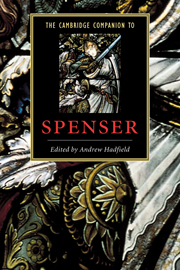Book contents
- Frontmatter
- Introduction
- 1 Spenser's life and career
- 2 Historical contexts: Britain and Europe
- 3 Ireland: policy, poetics and parody
- 4 Spenser's pastorals: The Shepheardes Calender and Colin Clouts Come Home Againe
- 5 The Faerie Queene, Books I-III
- 6 The Faerie Queene, Books IV-VII
- 7 Spenser's shorter poems
- 8 Spenser's languages: writing in the ruins of English
- 9 Sexual politics
- 10 Spenser's religion
- 11 Spenser and classical traditions
- 12 Spenser and contemporary vernacular poetry
- 13 Spenser's influence
- Index
Introduction
the relevance of Edmund Spenser
Published online by Cambridge University Press: 28 May 2006
- Frontmatter
- Introduction
- 1 Spenser's life and career
- 2 Historical contexts: Britain and Europe
- 3 Ireland: policy, poetics and parody
- 4 Spenser's pastorals: The Shepheardes Calender and Colin Clouts Come Home Againe
- 5 The Faerie Queene, Books I-III
- 6 The Faerie Queene, Books IV-VII
- 7 Spenser's shorter poems
- 8 Spenser's languages: writing in the ruins of English
- 9 Sexual politics
- 10 Spenser's religion
- 11 Spenser and classical traditions
- 12 Spenser and contemporary vernacular poetry
- 13 Spenser's influence
- Index
Summary
While Wilfred Owen, the English First World War poet, was recovering from shell shock at the 13th Casualty Clearing Station in Amiens, France, he wrote to his mother, describing a pleasant spring day out in the nearby countryside. Owen carefully contrasted the horror of the 'whiz-bangs and machine guns' to the delight of rural France by recalling a significant literary memory:
The scenery was such as I never saw or dreamed of since I read the Fairy Queene. Just as in the Winter when I woke up lying on the burning cold snow I fancied that I must have died & been pitch-forked into the Wrong Place, so, yesterday, it was not more difficult to imagine that my dusky barge was wending up to Avalon, and the peace of Arthur, and where Lancelot heals him of his grievous wound.
The fact that the letter refers to Arthur, Lancelot and Avalon, and to an episode that does not feature in Spenser's poem, means that Owen was undoubtedly thinking of Malory's Morte D'Arthur rather than The Faerie Queene.
- Type
- Chapter
- Information
- The Cambridge Companion to Spenser , pp. 1 - 12Publisher: Cambridge University PressPrint publication year: 2001
- 1
- Cited by



